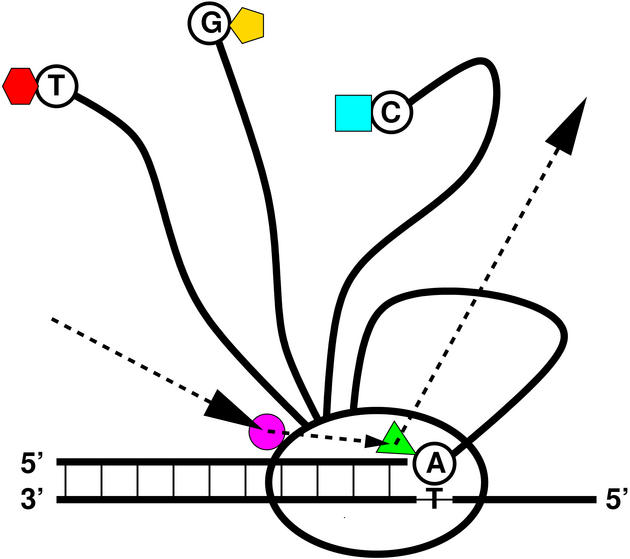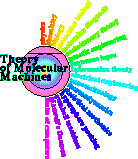MedusaTM Sequencing
Thomas D. Schneider,
Ilya Lyakhov,
and
Danielle Needle
Filed with the US Patent Office on 2005 December 12
2010 March 03: Claims allowed.
European Patent 1960550
US Patent No. 7,871,777, Issued 18 Jan 2011
|
Imagine a sequencing machine
the size of a molecule
that could sequence RNA in a living cell!
|
|

|
Benefits of the MedusaTM Sequencer
MedusaTM Sequencing:
- is simple because there is only one reagent
- is accurate for counting individual mRNAs or DNAs
- has low error rate per base,
and this can be improved by modifying the polymerase
- is fast because a single microscope
can be used to obtain many sequences in parallel
- has exceptionally low cost per sequencing device
- has many options for technical improvements
- could be used in the clinic along with
sequence walkers
to analyze patient's genetic diseases
(e.g.
Medical Applications of Sequence Walkers:
ABCR Mutation G863A)
Informal description of the Invention:
The MedusaTM Sequencer is a
single-molecule sequencing
device that consists of a DNA (or RNA) polymerase
attached to a set of four flexible arms.
The tip of each arm carries a nonhydrolyzable nucleotide triphosphate
analog and a
spectrally distinct Forster Resonance Energy Transfer (FRET) acceptor
fluorophore.
A donor fluorophore attached to the polymerase
excites an acceptor fluorophore by FRET
if the fluorophores are close to each other.
A MedusaTM Sequencer binds to a DNA primer
hybridized to the DNA or RNA to be sequenced.
The four arms
with nucleotide tips
"test" the polymerase pocket
by diffusing in and out.
The arm tip that has the nucleotide
complementary to the unknown base of the template
will dwell longer
in the pocket
than the other three that are not complementary.
However, the polymerase will not incorporate the nucleotide on the
tip of the arm into the nascent strand because the
nucleotide triphosphate
α-β bond
is nonhydrolyzable.
FRET between the donor on the polymerase and the
acceptor at the arm tip
produces a characteristic spectrum that identifies the bound base.
Free hydrolyzable dNTPs (or NTPs) allow the MedusaTM Sequencer to step
forward. The series of FRET signals reveals
the unknown nucleotide sequence.
A MedusaTM Sequencer could also be
injected into a cell
to read mRNA sequences
inside a living organism.
Coded versions of the MedusaTM Sequencer can signal
when the device has been damaged.
See also
High Speed Parallel Molecular Nucleic Acid Sequencing.
See also
Rod-Tether Nanoprobes!
- Federal Register: April 5, 2006 (Volume 71, Number 65)
[Page 17119-17121]
- WO/2007/070572 PROBE FOR NUCLEIC ACID SEQUENCING AND METHODS OF USE
at the World Intellectual Property Organization.
To see the
application, click on 'Documents' and then get the "21.06.2007 Initial
Publication without ISR (A2 25/2007)" zip file.
This contains the entire application with drawings at the end.
-
Published Application 20080299565
at the US Patent and Trademark Office
2009 Jan 09
-
patentlens - complete application with figures.
2010 Jul 07
-
United States Patent 7,871,777
Schneider, et al. January 18, 2011
issued at the
United States Patent and Trademark Office.
(If the link above fails, search for patent
7,871,777 at the
USPTO.)


Schneider Lab
origin: 2006 Jan 10
updated: 2018 Sep 26


